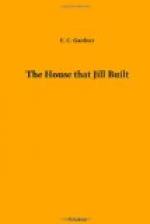Not willing to be moonstruck, even on the back of his head, he arose and went to the window to draw the curtain. There was a sort of curtainette at the top, opaque and immovable, serving simply to reduce the height of the window. At the sides there were gauzy draperies, too fancifully arranged to be rashly moved and too thin to serve the purpose of a curtain even against moonlight. He tried to close the inside shutters, but they clung to their boxes, refusing to stir without an order from the carpenter. At the risk of catching a cold or a fall, he opened the window and endeavored to bring the outside blinds together. One fold hung fast to the wall, the other he contrived to unloose, but the hook to hold it closed was wanting, and when he tried to fasten it open again the catch refused to catch, so he was compelled to shut the window and leave the swinging blind at the mercy of the wind. He then improvised a screen from a high-backed chair and an extra blanket, and again betook himself to bed. Stepping on a tack that had been left over when the floor matting was laid provoked certain exclamations calculated to exorcise the demon—or should I say alarm the angel?—of decorative art, and he was soon wrapped in the slumber of the just, undisturbed by esthetic visions.
[Illustration: WILL’S MASTERPIECE.]
After a time he became dimly conscious of a sense of alarm. At first, scarcely roused to understand the fear or its cause, he soon recognized a noise that filled his soul with terror—the stealthy sound of a midnight assassin; a faint rasping, intermittent and cautious, a sawing or filing the bolt of his door. He made a motion to spring up, upset a glass of water by his bedside and—frightened the rats from the particular hole they were trying to gnaw. In their sudden fright they dropped all pretense of secresy. They called each other aloud by name




